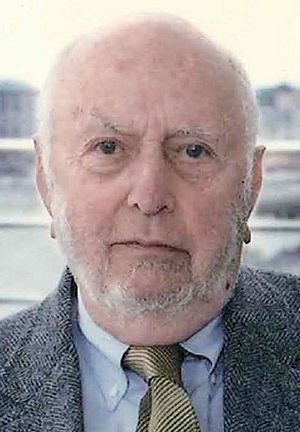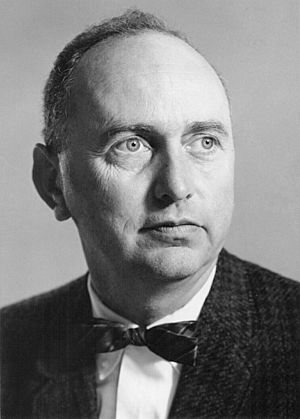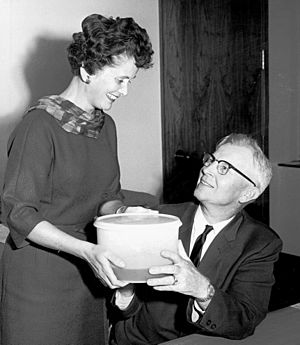Douglass North facts for kids
Quick facts for kids
Douglass North
|
|
|---|---|

Douglass North in 1997
|
|
| Born | November 5, 1920 Cambridge, Massachusetts, U.S.
|
| Died | November 23, 2015 (aged 95) Benzonia, Michigan, U.S.
|
| Institution | University of Washington Rice University Cambridge University Washington University in St. Louis Stanford University Hoover Institution US Merchant Marine Academy |
| Field | Economic history |
| School or tradition |
New institutional economics |
| Alma mater | University of California, Berkeley |
| Influences | Melvin M. Knight |
| Awards | Nobel Memorial Prize in Economic Sciences (1993) |
| Information at IDEAS / RePEc | |
Douglass Cecil North (born November 5, 1920 – died November 23, 2015) was an American economist. He was famous for his work in economic history, which is the study of how economies have changed over time.
In 1993, he won the Nobel Memorial Prize in Economic Sciences. He shared this award with Robert Fogel. The Nobel Committee said that North and Fogel "renewed research in economic history." They did this by using economic ideas and numbers to explain how economies and their rules change.
Contents
About Douglass North
Early Life and Education
Douglass North was born in Cambridge, Massachusetts, on November 5, 1920. His family moved many times when he was a child. This was because of his father's job at MetLife, an insurance company. They lived in places like Ottawa, Lausanne, New York City, and Wallingford, Connecticut.
North went to school at Ashbury College in Ottawa and the Choate School in Wallingford. He was accepted into Harvard. But his father became the head of MetLife on the west coast. So, North decided to go to the University of California, Berkeley instead.
At Berkeley, he studied political science, philosophy, and economics. He earned his bachelor's degree in 1942. After that, he joined the US Merchant Marine Academy. He graduated a year later and worked at sea for three years.
During World War II, North chose not to fight directly. Instead, he served as a navigator in the Merchant Marine. He traveled between San Francisco and Australia. During this time, he read a lot about economics. He also enjoyed his hobby of photography.
After the war, he taught navigation for a year. He then had to decide if he wanted to be a photographer or an economist. North went back to UC Berkeley. He earned his Ph.D. degree in economics in 1952. Soon after, he started working as a professor at the University of Washington.
Douglass North passed away on November 23, 2015. He was 95 years old and died at his summer home in Benzonia, Michigan.
His Career as an Economist
From 1951 to 1960, North was a professor at the University of Washington. In 1960, he became an editor for the Journal of Economic History. He helped make a new way of studying economic history popular. This method is called Cliometrics, or New Economic History. It uses economic ideas and numbers to understand the past.
He worked as a professor at the University of Washington until 1983. He also led the economics department there for many years. Later, he taught at Rice University and Cambridge University. In 1983, he joined Washington University in St. Louis. He also worked at the Hoover Institution at Stanford University.
In 1991, he received the John R. Commons Award. He was the first economic historian to win this award. It is given by the International Honors Society for Economics.
What He Studied
Douglass North helped start the International Society for the New Institutional Economics (ISNIE). This group studies how rules, customs, and organizations (called "institutions") affect how economies work.
His research looked at many important topics. These included:
- Property rights: These are the rules about who owns what.
- Transaction costs: These are the costs of doing business, beyond the price of goods.
- How markets work: He studied the rules and structures that make markets possible.
- Economic organization in history: He looked at how economies were set up in the past.
- Economic development: He also studied how countries grow their economies, especially developing countries.
North was an expert for the Copenhagen Consensus. He also advised governments around the world. He researched how countries move from being "natural states" to having long-lasting economic growth. He also advised non-profit groups like Vipani.
Personal Life
Douglass North was married two times. His first marriage was to Lois Heister in 1944. They had three sons: Douglass Jr., Christopher, and Malcolm. Lois Heister became a well-known activist and politician. This marriage later ended. North married Elisabeth Case in 1972.
His Impact and Legacy
As a Nobel Prize winner, Douglass North was very well-known. His ideas influenced many people, both at universities and around the world. His research in New Economic History inspired many other economists and historians. These included people like Jonathan Hughes, Richard Sutch, and Lance E. Davis.
See also
 In Spanish: Douglass North para niños
In Spanish: Douglass North para niños
 | Kyle Baker |
 | Joseph Yoakum |
 | Laura Wheeler Waring |
 | Henry Ossawa Tanner |



